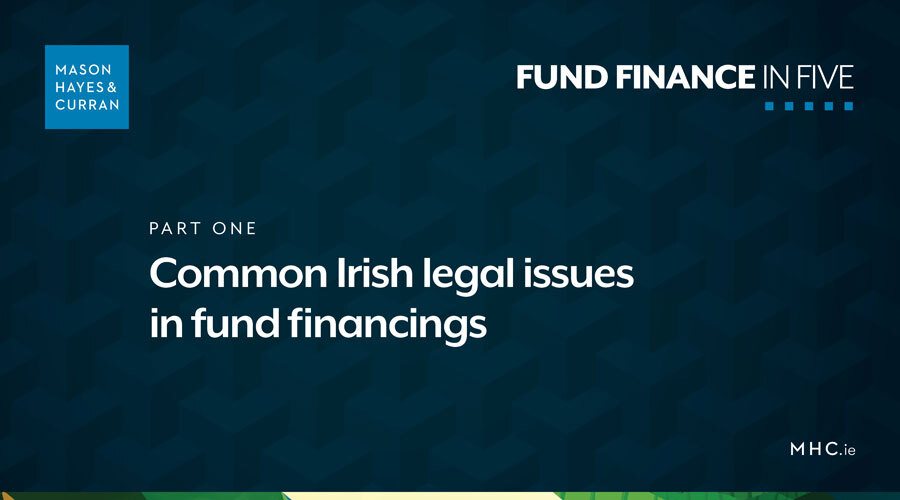Irish Fund Finance in Five – Part 1
Common Irish Legal Issues in Fund Financings

Download full Fund Finance in Five series
Ireland is currently home to over 8,880 funds with over €4.9 trillion in net assets. More than 1,000 fund managers from over 50 different countries have assets administered in Ireland, including 17 of the top 20 global asset managers. As a destination for fund managers, Ireland offers access to the EU-wide marketing passport for UCITS and AIFs. Accordingly, Ireland is established as a domicile of choice for the global investment funds industry and the fund industry in Ireland continues to grow year on year.
In addition to the growth of the Irish investment funds industry, the global fund finance industry has experienced rapid growth over the last number of years. The fund finance industry has proven itself to be robust and withstood a number of external market factors and periods of volatility, such as:
- The current higher interest environment
- The exit of certain market participants, and
- Onerous capital requirements for financial institutions
As both the Irish investment funds industry and the global fund finance industry continues to grow, naturally the number of fund finance transactions involving Irish vehicles also continues to grow. Over time, Ireland has proven itself to be a convenient jurisdiction in which to conduct fund finance transactions. With its English-speaking population and its common law legal system, market participants based from other jurisdictions, such as the UK and the US, often find transactions involving an Irish nexus to be convenient and familiar.
We have prepared this “Irish Fund Finance in Five” series to act as a comprehensive overview of all things Irish law related in the fund finance market. This series will be split into five parts, consisting of:
- Part 1 – Common Irish Legal Issues in Fund Financings
- Part 2 – Irish Security Considerations
- Part 3 – Irish Legal Due Diligence Considerations
- Part 4 - Irish Subscription Documents Considerations
- Part 5 - Overview of Irish Fund Structures
The issues examined by us in this series act only as a summary and are not intended to be exhaustive. As readers will appreciate, this series should not be considered a substitute for legal advice and lenders and funds should engage legal counsel at the outset of a transaction to ensure that these issues are given appropriate consideration.
Download full Fund Finance in Five series
Introduction
In Part 1 of our “Irish Fund Finance in Five” series, we set out and discuss some of the Irish specific issues which we regularly navigate when advising on fund finance transactions with an Irish nexus, including:
- The prohibition on third party guarantees
- Issues arising during due diligence
- Security considerations where there are Irish entities or Irish secured assets involved
- Practical considerations, and
- Applicability of the Irish Securitisation Regulations
1. Prohibition on third party guarantees or credit support
MHC Update 21 March 2025: There has been recent Central Bank of Ireland guidance in respect of third party guarantees which impacts on the analysis in this section. We have summarised this guidance.
The Central Bank of Ireland’s AIF Rulebook prohibits Irish regulated funds from providing guarantees, security or credit support in favour of a third party. This prohibition can prove to be problematic in fund financing transactions where it is expected that funds within the structure will guarantee the relevant borrowing. This regularly arises in transactions whereby a subscription line facility is being provided and a master-feeder structure is in place. In these circumstances, this prohibition prevents an Irish feeder fund from directly providing guarantees, security or credit support to lenders of the master fund borrower. However, there is a workaround to this prohibition whereby “cascading security” is granted by the Irish feeder fund. Some readers may be familiar with this approach in non-Irish structures, for example in the context of restrictions on granting security under ERISA. This involves:
- The non-borrowing feeder fund granting a charge and security assignment in favour of the master fund over both (i) the feeder fund’s uncalled commitments from its investors and (ii) the bank accounts which those capital calls are to be paid into (the Feeder Security Document), as security for its obligation to fund capital commitments to the master fund; and
- The master fund in turn granting a charge and security assignment in favour of the lender over (i) its uncalled commitments from the feeder fund (and any other investors), (ii) the bank accounts which those capital calls are paid into and (iii) its rights under the Feeder Security Document, as security for its borrowings from the lender.
Where a cascading security structure is in place, the lender can enforce directly against the feeder fund. This is done by enforcing the security granted by the master fund under the Feeder Security Document.
While not typically applicable in a fund finance transaction, there is an exception to the prohibition on third party guarantees that should be mentioned. This exemption is where this type of support is provided for a 100% owned subsidiary of an Irish regulated fund. However, Irish fund financing transactions frequently involve entities which are not part of the same group so this is not usually relevant in a fund financing context.
2. Security with an Irish nexus
When security is to be granted by an Irish fund, or where security is to be granted over any asset located in Ireland, consideration and Irish law advice should be taken to ensure this is completed correctly. In general, the doctrine of lex situs is applied to determine whether it is appropriate to take Irish law governed security over an asset. Examples of assets which are deemed to be located in Ireland and over which Irish law security should typically be taken are:
- Bank accounts located in Ireland
- Shares or interests in an Irish company or fund, and
- Any Irish law governed contract
Where the main finance documents are governed by the laws of another jurisdiction, such as New York law, it is common for security over Irish assets to be granted in separate security documents. For example, this might involve separate New York law and Irish law security agreements in favour of the same secured party and regarding the same collateral. While we understand that this can cause issues in other jurisdictions, this does not cause any issues under Irish law. Accordingly, this would allow the secured party flexibility to determine the appropriate route to enforcement to the extent an enforcement scenario arose.
This is an issue that we will consider in more detail in Part 2 of this series, entitled ‘Irish Security Considerations’.
3. Practical considerations
When advising on fund finance transactions involving an Irish nexus, there are a number of practical issues that arise from time to time. However, as long as these issues are identified and considered at the outset of the transaction, arrangements can be put in place to ensure that they do not result in any delay to the timely completion of the relevant transaction.
Fund service providers
Typically, the cooperation of fund service providers, or FSPs, is required to complete a fund finance transaction. Cooperation is necessary for a variety of different factors, such as requiring a depositary or account bank to enter into control arrangements or to cover off issues identified in the due diligence of the fund borrower. As those experienced in dealing with FSPs will be aware, each FSP can have their own quirks, such as having:
- Their own prescribed form and template documentation, eg for control agreements
- A prolonged internal approvals process
- Particular requirements which the secured parties need to satisfy, eg certificates of incumbency, and
- Certain signing requirements
Ultimately, an FSP does not have the same commercial motivation for entering into the finance documentation as the borrower / lender (other than the FSP’s commercial motivation for maintaining its relationship with the fund). To the extent that the engagement of any FSP is required, this should be identified at the outset of the matter and engagement with the FSP should be commenced to avoid delays.
Security registrations
Where an Irish entity grants security, it will usually be required to register the details of that security with the applicable registry. Depending on the nature of the Irish entity, security registrations are typically required to be filed with either the Companies Registration Office or the Central Bank of Ireland.
Where security registrations are applicable, the directors of the relevant entity must ensure they are made within the relevant timeframe. However, in practice, it will usually be the lenders’ Irish counsel who will make the security registrations. Lenders’ counsel generally undertake to do this so that control of the process can be maintained and the priority of the security can be preserved. To complete these registrations, the solicitors completing the filing require an authorisation to do so from the parties. To ensure borrower cooperation is not required post-closing, experienced Irish counsel acting for a secured party will include authorisation wording within the finance documents permitting them to make these registrations.
In addition, where an Irish entity creates a fixed charge over book debts, there is an additional filing that needs to be made with the Irish Revenue Commissioners within the relevant timeframe. In order to make this filing, the tax registration number of the chargor needs to be included. To ensure that this filing can be made before the relevant deadline, experienced Irish counsel acting for a secured party will include an additional certification in the formalities certificate providing this information.
Opinions and searches
In fund finance transactions, the standard approach is to provide split Irish legal opinions as a condition precedent to signing. Borrower’s counsel typically opines on capacity, while lender’s counsel provides the enforceability opinion. However, in some cases, a single legal counsel may issue the full suite of opinions. In order for opinions to be issued, it is necessary to conduct searches against the relevant Irish entities that are party to the transaction. Subject to limited exceptions, it is customary to rely on searches that are completed on the same day as the opinion is to be issued.
It is important that the parties clearly communicate their timing expectations for completion of the transaction. This will give legal counsel sufficient notice to arrange for the searches to be carried out prior to the relevant cut-off time on the closing date. This can be a particular issue on US transactions, given the time difference. In addition, parties should be aware of any upcoming public holidays in Ireland as it will not be possible to carry out searches on these days.
Execution of documents
As will be examined in more detail in Part 5 of this series entitled ‘Overview of Irish Fund Structures’, there are a number of different structures that Irish investment funds may be established under. Additionally, Irish entities may perform a role for non-Irish domiciled funds. Instances of this occur where there is an Irish AIFM.
How an Irish entity executes a transaction document will depend on the nature of the entity itself and the form of the transaction document. Where an Irish entity is required to execute a document as a deed, it will often be required to do so with “wet-ink” signatures. Certain Irish entities, such as private limited companies, are required to execute deeds by affixing their common seal. The common seal must be countersigned by a specified number of directors or the company secretary. From a practical perspective, it may not be possible to arrange for the company seal and the signatories to be physically present to arrange for execution. A common work-around to this issue is for the Irish entity to appoint certain persons under a power of attorney to execute the relevant finance documents on its behalf. However, this would still require the attorney to execute the document as a deed in the presence of a witness.
Accordingly, experienced Irish counsel will raise this issue at the outset of a transaction so the appropriate arrangements can be put in place.
4. Due diligence-related issues
Having regard to the structure of the borrower fund and the nature of the proposed fund finance transaction, detailed due diligence will need to be carried out. While carrying out this due diligence can sometimes be a timely process, identifying issues at an early stage can reduce costs, prevent strained relationships, and ultimately ensure the transaction can be structured and documented in a workable manner.
We consider these due diligence issues in more detail in Part 3- ‘Due Diligence Considerations’ and Part 4 - ‘Irish Subscription Documents Considerations’ of our “Irish Fund Finance in Five” series.
5. Applicability of securitisation regulations
In the context of NAV and hybrid facilities in particular, the EU Securitisation Regulation 2017/2402 (the Securitisation Regulation) should be kept in mind by lenders, sponsors and legal advisers. The Securitisation Regulation came into force in Ireland in 2019. It sets out a general framework for securitisation, establishing due diligence, risk retention and transparency requirements for parties involved in transactions that come within its scope.
The relatively broad drafting of the Securitisation Regulation means that a potentially wide range of transactions could be deemed to be ‘securitisations’, and therefore within the scope of the Securitisation Regulation, even if this was not the original intention of the transaction parties. In that regard, legal counsel should carefully scrutinise the transaction if some, or all, of the following structural aspects appear:
- There are tranches of debt
- There is reliance on an exposure or pool of exposures in order to make payments in the transaction
- There is subordination of the tranches of debt which determines the distribution of losses during the lifetime of the transaction, and
- The transaction does not otherwise fall within the ‘specialised lending’ exemption set out in Article 147(8) of the Capital Requirements Regulation
Where applicable, the Securitisation Regulation may create substantial ongoing obligations for a number of the parties in the transaction. A failure to comply with these can result in the Central Bank of Ireland imposing administrative sanctions and significant fines. The analysis as to whether the Securitisation Regulation applies can vary depending on the nature of the transaction.
At the outset of a transaction (and particularly a NAV or hybrid lending transaction where the features listed at (i) – (iv) above could be relevant), it is important to determine whether the proposed transaction would be subject to the Securitisation Regulation. Should they be applicable, this will allow time for the parties to consider the impact of the Securitisation Regulation and/or any adjustments to the transaction structure that may be necessary or desirable.
Conclusion
The issues summarised in this article are not exhaustive. Naturally, lenders, borrowers and instructing counsel will all benefit from the appointment of experienced Irish law counsel to identify and navigate any Irish specific issues that arise. This should ensure that unnecessary delays and costs can be avoided.
For more information and expert advice, please reach out to a member of our Fund Finance team. Stay tuned for the remaining issues of our ‘Fund Finance in Five’ series.
The content of this article is provided for information purposes only and does not constitute legal or other advice.
Share this:



